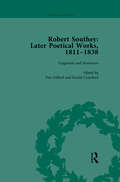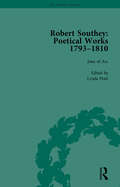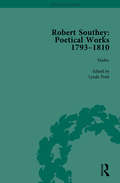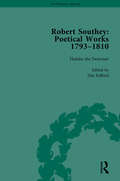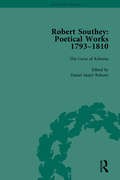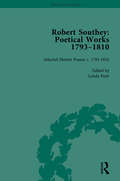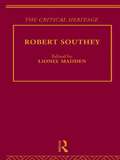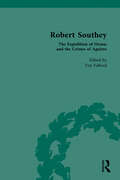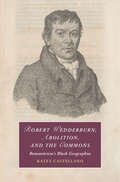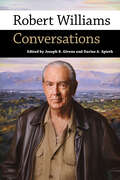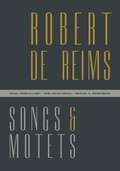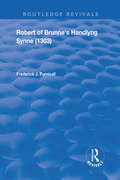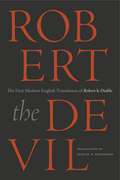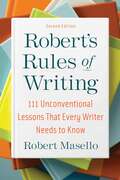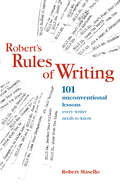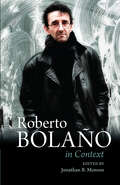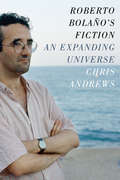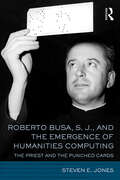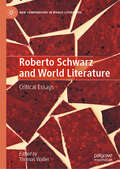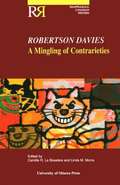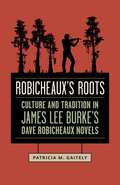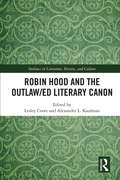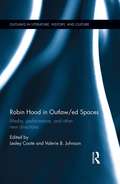- Table View
- List View
Robert Southey: Later Poetical Works, 1811-1838 Vol 4
by Tim Fulford Rachel Crawford Diego Saglia Carol Bolton Lynda Pratt Ian Packer Daniel E WhiteCentral to any reappraisal of Southey’s mid to late career, is 'Roderick'. This best-selling epic romance has not been republished since 1838 and is contextualised here within Southey’s wider oeuvre. The four-volume edition also benefits from a general introduction, volume introductions, textual variants, endnotes and a consolidated index.
Robert Southey: Poetical Works 1793–1810 Vol 1
by Tim Fulford Daniel Roberts Lynda PrattThis edition of Robert Southey's early poetry seeks to restore Southey the poet to his place at the centre of late 18th and early 19th century British literary culture. This collection of his poetical works critically reassesses Southey's epics and romances.
Robert Southey: Poetical Works 1793–1810 Vol 2
by Tim Fulford Daniel Roberts Lynda PrattThis edition of Robert Southey's early poetry seeks to restore Southey the poet to his place at the centre of late 18th and early 19th century British literary culture. This collection of his poetical works critically reassesses Southey's epics and romances.
Robert Southey: Poetical Works 1793–1810 Vol 3
by Tim Fulford Daniel Roberts Lynda PrattThis edition of Robert Southey's early poetry seeks to restore Southey the poet to his place at the centre of late 18th and early 19th century British literary culture. This collection of his poetical works critically reassesses Southey's epics and romances.
Robert Southey: Poetical Works 1793–1810 Vol 4
by Tim Fulford Daniel Roberts Lynda PrattThis edition of Robert Southey's early poetry seeks to restore Southey the poet to his place at the centre of late 18th and early 19th century British literary culture. This collection of his poetical works critically reassesses Southey's epics and romances.
Robert Southey: Poetical Works 1793–1810 Vol 5
by Tim Fulford Daniel Roberts Lynda PrattThis edition of Robert Southey's early poetry seeks to restore Southey the poet to his place at the centre of late 18th and early 19th century British literary culture. This collection of his poetical works critically reassesses Southey's epics and romances.
Robert Southey: The Critical Heritage (Critical Heritage Ser.)
by Lionel MaddenThe Critical Heritage gathers together a large body of critical sources on major figures in literature. Each vlume presents contemporary responses to a writer's work, enabling the student or researcher to read the material themselves.
Robert Southey: The Expedition of Orsua; and the Crimes of Aguirre
by Tim FulfordFirst published in 1821, Robert Southey’s 'Expedition of Orsua and the Crimes of Aguirre' is the first account in English of one of the earliest expeditions down the Amazon River, made in the years 1560-1 by a renegade band of Spanish conquistadors in search of El Dorado.This sensational story features mutiny, madness, and murder– the total breakdown of order among power-hungry colonists as they are carried further and further into the immense jungle and further and further from European settlements. This edition contains a comprehensive critical apparatus that make sense of the major issues posed by the text and show how it contributes to studies of Southey, of colonialism and of travel/exploration writing in the nineteenth century more widely. The volume features a critical and contextual introduction, which sets out the origins and composition of the text together with its publication history, as well as offer a carefully considered view of the interplay between it and other narratives of exploration of the period, bringing into view the wide array of sources and influences Southey drew from.This book will be of interest to students and scholars of 19th century literature and history.
Robert Wedderburn, Abolition, and the Commons: Romanticism's Black Geographies (Cambridge Studies in Romanticism)
by Katey CastellanoBuilding on scholarship in Romanticism, Black studies, and environmental humanities, this book follows the political thought of Robert Wedderburn, a Black Romantic-era writer. Wedderburn was deeply influenced by his enslaved mother and grandmother, who raised him in Jamaica. After migrating to London, he became a key figure in ultraradical circles and was prosecuted by the British government for blasphemous libel. Wedderburn's vision for abolition from below sought to forge a transatlantic alliance between English agrarian radicals and enslaved people in the Caribbean. Instead of emancipation administered by British colonial and commercial interests, Wedderburn championed the ecological projects of enslaved and Maroon communities in the Caribbean as models for liberation. His stories of Black, place-based opposition to slavery provide an innovative lens for rereading significant aspects of the Romantic period, including the abolition of slavery, landscape aesthetics, and nineteenth-century radical politics.
Robert Williams: Conversations (Conversations with Comic Artists Series)
by Joseph R. Givens and Darius A. SpiethA legendary figure of underground comix, Robert Williams (b. 1943) is an important social chronicler of American popular culture. The interviews assembled in Robert Williams: Conversations attest to his rhetorical powers, which match the high level of energy evident in his underground comix and action-filled canvases.The public perception of Williams was largely defined by two events. In 1987, Guns N’ Roses licensed a Williams painting for the cover of their best-selling album Appetite for Destruction. However, Williams’s cover art stirred controversies and was moved to the inside of the album. The second defining event was Williams’s participation in the Helter Skelter exhibition at the Los Angeles Museum of Contemporary Art in 1992. Protests ensued when a room was set aside to feature his work. Uncovering long-forgotten and hard-to-find interviews, this collection serves as a social chronicle of counterculture from the 1960s through the early 2000s. One of the founders of the original ZAP Comix collective in the 1960s, Williams drew inspiration from pulp fiction, hot rod culture, pin-up girls, and traditional academic art. He invented the comics character Cootchy Cooty and worked for the studios of Ed “Big Daddy” Roth. He rubbed shoulders with outlaw motorcycle gangs and tested the legal limits of what was permissible comic book art during his day. He has often been described as a figure courting scandal and controversy, a reputation he discusses repeatedly in some of the interviews here. Since the 1980s, Williams has emerged as a force in the fine art world, raising interesting questions about how painting and comic art interrelate.
Robert de Reims: Songs and Motets
by Robert de ReimsRobert de Reims, also known as "La Chievre de Rains," was among the earliest trouvères—poet-composers who were contemporaries of the troubadours but who wrote in the dialects of northern France. This critical edition provides new translations into English and modern French of all the songs and motets ascribed to him, along with the original texts, the extant music, and a substantive introduction.Active sometime between 1190 and 1220, Robert was an influential figure in the literary circles of Arras. Thirteen compositions set to music are here attributed to him, including nine chansons and four polyphonic motets that were broadly disseminated in the thirteenth century and beyond. Robert’s work is exceptional on a number of fronts. He lavished particular care on the phonic harmony of his words. Acoustic luxuriance and expertise in rhyming, grounded in the play of echoes and variation (often extending into the music), constitute the hallmark of his poetry. Moreover, he is the earliest trouvère known to have composed a parodic sotte chanson contre Amours (silly song against Love).Located clearly at the nexus of monophonic song and polyphony, Robert’s corpus also poses the intriguing question of trouvère participation in the development of the polyphonic repertory. The case of Robert de Reims jostles and tempers the standard history of the chanson and motet.Accessible and instructive, this trilingual critical edition of his complete works makes the oeuvre of this innovative and consequential trouvère available in one volume for the first time.
Robert de Reims: Songs and Motets
by Robert de ReimsRobert de Reims, also known as “La Chievre de Rains,” was among the earliest trouvères—poet-composers who were contemporaries of the troubadours but who wrote in the dialects of northern France. This critical edition provides new translations into English and modern French of all the songs and motets ascribed to him, along with the original texts, the extant music, and a substantive introduction.Active sometime between 1190 and 1220, Robert was an influential figure in the literary circles of Arras. Thirteen compositions set to music are here attributed to him, including nine chansons and four polyphonic motets that were broadly disseminated in the thirteenth century and beyond. Robert’s work is exceptional on a number of fronts. He lavished particular care on the phonic harmony of his words. Acoustic luxuriance and expertise in rhyming, grounded in the play of echoes and variation (often extending into the music), constitute the hallmark of his poetry. Moreover, he is the earliest trouvère known to have composed a parodic sotte chanson contre Amours (silly song against Love).Located clearly at the nexus of monophonic song and polyphony, Robert’s corpus also poses the intriguing question of trouvère participation in the development of the polyphonic repertory. The case of Robert de Reims jostles and tempers the standard history of the chanson and motet.Accessible and instructive, this trilingual critical edition of his complete works makes the oeuvre of this innovative and consequential trouvère available in one volume for the first time.
Robert of Brunne's Handlyng Synne: And its French Original (Routledge Revivals)
by Frederick J. FurnivallPublished in 1901, this book provides an English and French version of the 1303 text by Robert Manning of Brunne. Handlyng Synne was adapted from an Anglo-Norman work attributed to William of Waddington, the Manuel de Pechiez. It consists of more than 12,000 lines of verse, arranged in four-stress couplets. It is a discussion of the ten commandments, the seven deadly sins, the seven sacraments, and the elements of confession, illustrated throughout by exempla, or moral anecdotes, thirteen of which do not appear in the Manuel. Handlyng Synne has been described as "a reduction of the world's experience to a comprehensive moral scheme"
Robert the Devil: The First Modern English Translation of Robert le Diable, an Anonymous French Romance of the Thirteenth Century
by Samuel N. RosenbergSamuel N. Rosenberg, one of the premier translators of Old French, presents in this volume the first modern English-language version of the thirteenth-century French romance Robert le Diable, a tale of supernatural birth and spiritual redemption. Robert is born after his mother, a childless noblewoman, secretly calls upon Satan to help her conceive. His wicked behavior as a boy and, later, as a destructive young man is so brutal that one day Robert prevails upon his mother to reveal the secret of his birth and thus the source of his wickedness. Upon learning the truth, he leaves his privileged home in Normandy to seek salvation. Robert’s lengthy penance—under the aegis of the Pope and a pious hermit—begins with his acting as a mute fool in the Roman Emperor’s court and ends with his sainthood. In between he plays the hero’s role in defeating the Turks in battle and turns down the hand of the Emperor’s daughter in marriage, choosing instead to return to the hermit’s abode. The legend of Robert le Diable was extraordinarily influential in the seven hundred years after its creation, generating new versions and adaptations in various languages, ranging from sixteenth-century English adaptations by Wynken de Worde and Thomas Lodge to Giacomo Meyerbeer’s esteemed 1831 opera. Framed by a thoughtful introduction and thorough bibliography, this accessible translation renders the original octosyllabic rhymed couplets of the metrical Old French romance in energetic free verse.
Robert's Rules of Writing, Second Edition: 111 Unconventional Lessons That Every Writer Needs to Know
by Robert MaselloBestselling author Robert Masello guides working and aspiring writers alike with the hard-won advice, tricks of the trade, and indispensable encouragement that only a seasoned professional can provide.Although there&’s no shortage of books on writing and publishing, there&’s none quite like Robert&’s Rules of Writing: 111 Unconventional Lessons Every Writer Needs to Know. Drawing on his many years of experience as an award-winning journalist, TV writer, and the author of over twenty books published by mainstream houses and translated, to date, into nineteen languages, Robert Masello addresses all the issues that confront, and all the problems that beset, writers of all stripes.Whether you&’re working on a novel or a script, a memoir or a blog, an epic poem or a newspaper piece, you&’re going to have to find the best way to express yourself clearly, persuasively, and entertainingly. You&’ll have to find your own personal voice (much harder than it sounds) and use that unique voice to convey your story, your thoughts, and your opinions, to the many readers out there that you&’re eager to reach; with complete candor and welcome irreverence, Robert&’s Rules of Writing offers the inside knowledge that will help you do just that. As provocative as they are amusing, these rules are purposely designed to challenge the old axioms and get you thinking afresh about your work.In well over a hundred short but pithy takes, Masello guides you over hurdles, around obstacles, and through the seemingly insurmountable barriers to completion and ultimately publication—hooray!—of your writing. It&’s a lively, thought-provoking, and often downright funny addition to any veteran, or fledgling, writer&’s shelf.
Robert's Rules of Writing: 101 Unconventional Lessons Every Writer Needs to Know
by Robert MaselloThe 101 Rules You Need to Know *but no one has ever told you You already have a million writing books. You know the principles, the lectures, the "expert" techniques. And you've discovered that sometimes tried-and-true just equals tired. In Robert's Rules of Writing, successful author Robert Masello stomps out status quo writing advice and delivers 101 uninhibited techniques to improve your writing that include: Burn your journal (See rule 1) Strip down to your briefs (See rule 38) Spend time gossiping (See rule 61) Buy the smoking jacket (See rule 56) Skip the Starbucks (See rule 7) De-claim! De-claim! (See rule 63) Whether you're a fiction writer, freelancer, memoirist, or screenwriter, Robert's Rules of Writing gives you the unorthodox advice to transform your writing life and get published!
Roberto Bolaño In Context (Literature in Context)
by Jonathan B. MonroeFrom his first fifteen years in Chile, to his nine years in Mexico City from 1968 to 1977, to the quarter of a century he lived and worked in the Blanes-Barcelona area on the Costa Brava in Spain through his death in 2003, Roberto Bolaño developed into an astonishingly diverse, prolific writer. He is one of the most consequential and widely read of his generation in any language. Increasingly recognized not only in Latin America, but as a major figure in World Literature, Bolaño is an essential writer for the 21st century world. This volume provides a comprehensive mapping of the pivotal contexts, events, stages, and influences shaping Bolaño's writing. As the wide-ranging investigations of this volume's 30 distinguished scholars show, Bolaño's influence and impact will shape literary cultures worldwide for years to come.
Roberto Bolaño's Fiction
by Chris AndrewsSince the publication of The Savage Detectives in 2007, the work of Roberto Bolaño (1953--2003) has achieved an acclaim rarely enjoyed in contemporary fiction. Chris Andrews, a leading translator of Bolaño's work into English, explores the singular achievements of the author's oeuvre, engaging with its distinct style and key thematic concerns, incorporating his novels and stories into the larger history of Latin American and global literary fiction.Andrews provides new readings and interpretations of Bolaño's novels, including 2666, The Savage Detectives, and By Night in Chile while at the same time examining the ideas and narrative strategies that unify his work. He begins with a consideration of the reception of Bolaño's fiction in English translation, examining the reasons behind its popularity. Subsequent chapters explore aspects of Bolaño's fictional universe and the political, ethical, and aesthetic values that shape it. Bolaño emerges as the inventor of a prodigiously effective "fiction-making system," a subtle handler of suspense, a chronicler of aimlessness, a celebrator of courage, an anatomist of evil, and a proponent of youthful openness. Written in a clear and engaging style, Roberto's Bolano's Fiction offers an invaluable understanding of one of the most important authors of the last thirty years.
Roberto Bolaño's Fiction: An Expanding Universe
by Chris AndrewsSince the publication of The Savage Detectives in 2007, the work of Roberto Bolaño (1953–2003) has achieved an acclaim rarely enjoyed by literature in translation. Chris Andrews, a leading translator of Bolaño's work into English, explores the singular achievements of the author's oeuvre, engaging with its distinct style and key thematic concerns, incorporating his novels and stories into the larger history of Latin American and global literary fiction.Andrews provides new readings and interpretations of Bolaño's novels, including 2666, The Savage Detectives, and By Night in Chile, while at the same time examining the ideas and narrative strategies that unify his work. He begins with a consideration of the reception of Bolaño's fiction in English translation, examining the reasons behind its popularity. Subsequent chapters explore aspects of Bolaño's fictional universe and the political, ethical, and aesthetic values that shape it. Bolaño emerges as the inventor of a prodigiously effective "fiction-making system," a subtle handler of suspense, a chronicler of aimlessness, a celebrator of courage, an anatomist of evil, and a proponent of youthful openness. Written in a clear and engaging style, Roberto Bolano's Fiction offers an invaluable understanding of one of the most important authors of the last thirty years.
Roberto Busa, S. J., and the Emergence of Humanities Computing: The Priest and the Punched Cards
by Steven E. JonesIt’s the founding myth of humanities computing and digital humanities: In 1949, the Italian Jesuit scholar, Roberto Busa, S.J., persuaded IBM to offer technical and financial support for the mechanized creation of a massive lemmatized concordance to the works of St. Thomas Aquinas. Using Busa’s own papers, recently accessioned in Milan, as well as IBM archives and other sources, Jones illuminates this DH origin story. He examines relationships between the layers of hardware, software, human agents, culture, and history, and answers the question of how specific technologies afford and even constrain cultural practices, including in this case the academic research agendas of humanities computing and, later, digital humanities.
Roberto Schwarz and World Literature: Critical Essays (New Comparisons in World Literature)
by Thomas WallerFirst of its kind, this essay collection examines the intellectual trajectory of Latin America’s foremost literary critic and dialectician, underscoring its relevance for contemporary debates on world literature. The volume shows how Schwarz’s concrete analyses of Brazilian literature and culture offer a theoretical blueprint to understand the literary registration of capitalism’s combined and uneven development. Exploring concepts such as misplaced ideas, objective form, and volubility, the contributors show how the nuance of Schwarz’s interpretive practice can be productively remodelled into a program for world-literary studies. Throughout the volume, Schwarz’s unparalleled contributions to cultural theory, long neglected in the Anglophone academy, are rigorously and creatively debated. Roberto Schwarz and World Literature is a primer on literary criticism as concrete practice and an indispensable book for those interested in how literary form mediates social reality.
Robertson Davies: A Mingling of Contrarieties
by Camille R. La Bossiere Linda M. MorraThis collection of essays on the writing of Robertson Davies addresses the basic problems in reading his work by looking at the topics of doubling, disguise, irony, paradox, and dwelling in "gaps" or spaces "in between."
Robicheaux's Roots: Culture and Tradition in James Lee Burke's Dave Robicheaux Novels
by Patricia M. GaitelyJames Lee Burke developed the character of Cajun detective Dave Robicheaux through twenty mystery novels published over three decades. Despite readers' increasing interest in Detective Robicheaux, his habits and preferences originate from a culture still unfamiliar to many of the books' fans. In Robicheaux's Roots, Patricia M. Gaitely explores the music, food, language, and folklore of southwest Louisiana and illuminates the cultural sources that Burke incorporated into this gripping series. Part of Robicheaux's appeal, Gaitely shows, rests in his connection to his hometown of New Iberia, with its faults, charm, and reliance on the old ways. Multiple cultural strands coexist in this region, including Creole and Cajun French dialect; African American folk sayings; swamp pop, zydeco, and blues music; and voodoo, Catholicism, evangelicalism, and faith healing. These aspects of Cajun life weave throughout Robicheaux's world. The commingling of so many traditions provides multiple meanings for even the most common encounters--water can be both natural element and medium between living and dead; and gumbo, jambalaya, and crawfish may represent more than simply regional foods. Additionally, Gaitely demonstrates that beneath the pleasant veneer of southern hospitality, a persistent legacy of violence and vengeance leaves a lasting mark on the lives of Robicheaux and the other characters. Robicheaux's Roots reveals how elements of south Louisiana's culture signal a sense of belonging but also recall the area's history of isolation. As a result, readers gain a deeper understanding of Robicheaux himself and an enhanced appreciation for Burke's acclaimed series.
Robin Hood and the Outlaw/ed Literary Canon (Outlaws in Literature, History, and Culture)
by Alexander L. Kaufman Lesley CooteThis cutting-edge volume demonstrates both the literary quality and the socio-economic importance of works on "the matter of the greenwood" over a long chronological period. These include drama texts, prose literature and novels (among them, children's literature), and poetry. Whilst some of these are anonymous, others are by acknowledged canonical writers such as William Shakespeare, Ben Jonson, and John Keats. The editors and the contributors argue that it is vitally important to include Robin Hood texts in the canon of English literary works, because of the high quality of many of these texts, and because of their significance in the development of English literature.
Robin Hood in Outlaw/ed Spaces: Media, Performance, and Other New Directions (Outlaws in Literature, History, and Culture)
by Lesley Coote Valerie B. JohnsonFollowing in the tradition of recent work by cultural geographers and historians of maps, this collection examines the apparently familiar figure of Robin Hood as he can be located within spaces that are geographical, cultural, and temporal. The volume is divided into two sections: the first features an interrogation of the literary and other textually transmitted spaces to uncover the critical grounds in which the Robin Hood ’legend’ has traditionally operated. The essays in Part Two take up issues related to performative and experiential space, demonstrating the reciprocal relationship between page, stage, and lived experience. Throughout the volume, the contributors contend with, among other things, modern theories of gender, literary detective work, and the ways in which the settings that once advanced court performances now include digital gaming and the enactment of ’real’ lives.
